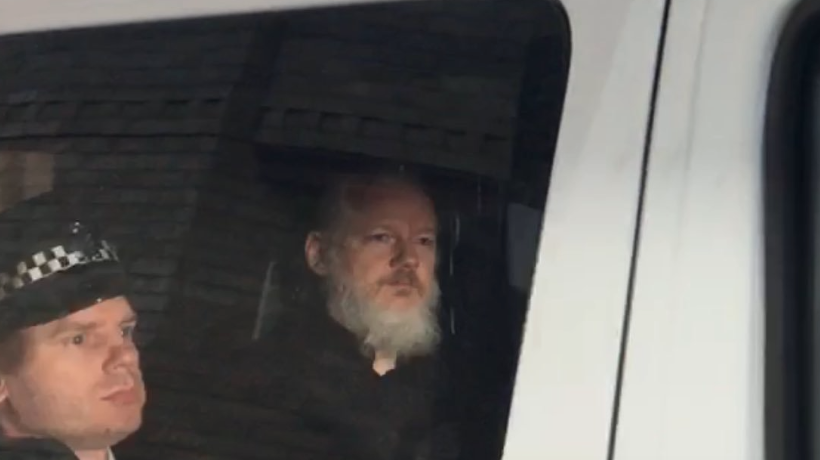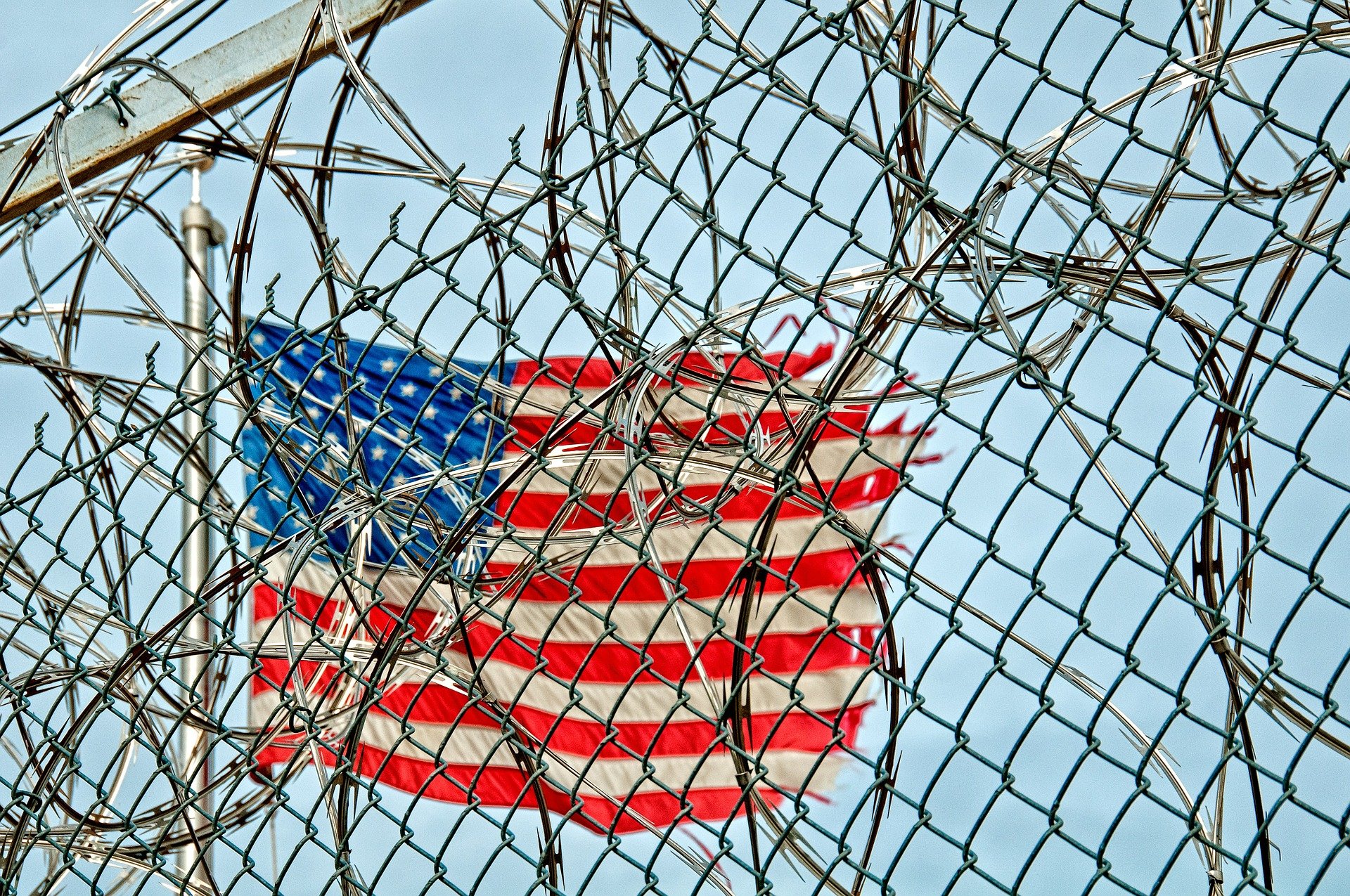If Washington presses an appeal, the WikiLeaks founder faces many more months in Covid-infested prison conditions he may not survive, writes Jonathan Cook.
By Jonathan Cook
Jonathan-Cook.net
 There was a hope in some quarters after Judge Vanessa Baraitser ruled on Monday against an application to extradite Julian Assange to the U.S., where he faced being locked away for the rest of his life, that she might finally be changing tack.
There was a hope in some quarters after Judge Vanessa Baraitser ruled on Monday against an application to extradite Julian Assange to the U.S., where he faced being locked away for the rest of his life, that she might finally be changing tack.
Washington has wanted Assange permanently silenced and made an example of – by demonstrating to other journalists its terrifying reach and powers of retaliation – ever since the WikiLeaks founder exposed U.S. war crimes in Iraq and Afghanistan a decade ago.
There were reasons, however, to be suspicious of what Baraitser was really up to even as she made her ruling in Assange’s favor. This district judge has a record of nodding through extradition cases, including several that have recently been overturned on appeal by a higher court.
Tomorrow, District Judge Vanessa Baraister will rule on Assange's US extradition.
The Ministry of Justice blocked our FOI request for a list of cases on which she's ruled since being appointed a DJ in 2011.
So we used Westlaw + Factiva to construct her extradition case list? pic.twitter.com/ViCuMHhe6i
— Matt Kennard (@kennardmatt) January 3, 2021
During the hearings back in September, Baraitser had endlessly indulged lawyers representing the U.S. while showing absolute disdain for Assange’s legal team, obstructing them at every turn. Her contempt for Assange and his political and moral worldview was on show throughout the proceedings. She often arrived in court with a prepared script she read from, barely feigning a pretense that she had listened to the legal arguments presented in court.
Please Contribute to Consortium
News‘ Winter Fund Drive
Her script always favored Washington’s line, apart from on those occasions when she took an even more hostile position towards Assange than requested by the U.S.. That included sealing him off from the rest of the court in an impregnable perspex box, treating him more like Hannibal Lecter than a publisher and journalist fighting for press freedom.
Much of the time, Baraitser sounded unnervingly like a prosecution barrister rather than the judge.
First, A Dangerous Ruling
My latest: The last decade has been about discrediting, disgracing and demonising Julian Assange. Today's court ruling denying his extradition to the US – though hugely welcome – should be seen as a continuation of that process https://t.co/FtrDGyHwF2
— Jonathan Cook (@Jonathan_K_Cook) January 4, 2021
So it was barely surprising, as I explained in my last post, that, while denying the extradition claim, she supported all the arguments advanced by the U.S. accruing to itself the right to prosecute Assange – and any other journalist – for the crime of doing journalism. She ignored the facts, the expert testimony presented in court and the legal arguments – all of which favored Assange – and backed instead what amounted to a purely political case made by the U.S.
She disregarded warnings from Assange’s legal team that acceptance of the political rationale for extradition amounted to an all-out attack on fundamental journalistic freedoms. She established a terrifying legal precedent for the U.S. to seize foreign journalists and prosecute them for “espionage” if they expose Washington’s crimes. Her ruling will inevitably have a profoundly chilling effect on any publication trying to dig out the truth about the U.S. national-security state, with terrifying consequences for us all.
But while she enthusiastically backed the political case for Assange’s extradition and trial, Baraitser at the same time got the WikiLeaks founder off the hook by accepting the humanitarian concerns raised by medical and prison experts. They had counselled that extradition to the U.S. could be expected to lead to Assange spending the rest of his life in a barbaric U.S. super-max prison, exacerbating mental health problems and the risk of suicide.
Then, A Perverse Ruling
Her ruling, while deeply disturbing in its political and legal implications, did at least suggest that Baraitser was ready to take a compassionate approach in regard to Assange’s health, even if not his journalistic exposure of Western war crimes. He should have walked free there and then, had the U.S. not immediately said it would appeal her decision.
Given Assange’s discharge by Baraitser, his team hoped that bail – his release from a high-security prison while the lengthy appeals process unfolds – would prove a formality. They hurried to make such an application after the extradition ruling on Monday, assuming that the legal logic of her decision dictated his release. Baraitser demurred, suggesting that they prepare their case and make it to her more fully on Wednesday.
It now seems clear the judge manipulated Assange’s defense team. Apparently like Assange’s lawyers, former British ambassador Craig Murray, who has attended and reported on the hearings in detail, was lulled by Baraitser into assuming that she wanted a cast-iron case from the defense to justify a decision to release Assange on bail.There were good reasons for their confidence. Any move to prevent his release would look perverse given that she had decided Assange should not be extradited or stand trial in the U.S.
Suicide Danger
They were deceived. Baraitser denied bail, effectively signaling that she thinks her ruling might be wrong and overturned in a higher court. That is extraordinary. It suggests that she has no confidence in her own judgment of the facts of the case. As Murray has noted: “There was little or no precedent for the High Court overturning any ruling against extradition on Section 91 health grounds.”
Any appeal by the U.S. against Baraitser’s ruling to discharge Assange will be hard to win. Its lawyers will have to prove that she was wrong not on her interpretation of the law, but in assessing verifiable facts. They will have to show that she was deceived by prison experts who warned – based on submissions made by the U.S. itself – that Assange would be subjected to permanent, inhuman solitary confinement in a U.S. super-max jail or that she was misled by medical experts who warned that in these conditions Assange would be at significant risk of suicide.
Julian Assange is one of just two inmates at Belmarsh maximum security prison—which houses 797 prisoners—being held for violating bail conditions, according to figures released to me last year.
Over 20% of the Belmarsh prison population is held for murderhttps://t.co/W1RT5s48oJ
— Matt Kennard (@kennardmatt) January 6, 2021
But the perversity of Baraitser’s decision runs deeper still. Her ruling keeps him locked up in Belmarsh, a high-security prison in London that is Britain’s version of a super-max jail. Her refusal to free him, or put him in house arrest with a GPS monitoring tag, flagrantly contradicts the expert assessments she concurred with during Monday’s extradition decision: that Assange is at high risk of suicide. Those expert evaluations are based on his current state – caused by his incarceration in Belmarsh.
Unlike Assange, most of Belmarsh’s inmates have been convicted or charged with major crimes. But while Assange long ago served out his only offence, a minor violation of the U.K.’s bail regulations, he has been routinely held in even worse conditions than the other prisoners.
If Assange’s mental health is in such poor shape and he is so likely to commit suicide, it is because of the horrifying regime of abuse he has already faced in Belmarsh over the past nearly two years – a regime classified as torture by the UN’s expert on the subject, Nils Melzer. Raising Assange’s hopes of release and then shutting him back in his cell, denying him the chance to see his partner and two young children for the first time since March, risks tipping him over the edge – an edge Baraitser herself is only too aware of and on which she based her decision to deny extradition.
No ‘Flight Risk’
In fact, the judge was up to something else entirely in delaying the bail hearing till Wednesday, two days later. She wanted – as presumably did those who have been supervising her behind the scenes – to refashion the image of her court, which for months has given every appearance of being entirely beholden to the U.S. administration.
As the corporate media briefly raised its head from its slumber to meaningfully acknowledge for the first time the Assange hearings, she wanted to ensure those reports noted how independent her court was. For two days, commentators could crow about British legal sovereignty and humanitarian values, even as most tacitly accepted her dangerous premise that the U.S. has a justified claim to extradite Assange.
When Baraitser slammed the cell door shut once again on Assange, leaving him exactly where he was before she discharged him, her decision was presented as little more than a technical ruling based on a reasonable assessment of Assange’s “flight risk.”
In fact, Assange is no flight risk, and never was. He didn’t “jump bail” in 2012 by heading into the Ecuadorian embassy. He sought political asylum there to escape the very real threat of being extradited to the U.S. for his journalism. He was accepted by the Ecuadorian authorities because they believed his fears were genuine.
Back then, a Swedish prosecutor had revived demands Assange return to Sweden for questioning over flimsy sexual assault allegations – allegations that had been dismissed by a previous prosecutor. That investigation, we now know, was kept alive at British insistence. Nonetheless, Sweden refused to give assurances that they would not extradite Assange on to the U.S., where a grand jury was drawing up charges against him.
Illicit Collusion
Assange’s decision to seek asylum in the embassy has, of course, been entirely vindicated by the fact that the U.S. did indeed seek his extradition – as soon as they could get their hands on him.
Baraitser even let the cat out of the bag herself at the bail hearing, disrupting her own narrative that he had “absconded” in 2012, when she stated – as evidence against Assange! – that he entered the embassy to evade the threat of extradition to the U.S.
In doing so, she undermined the narrative promoted for years by every corporate media outlet in the U.K. that Assange had “holed up in the Ecuadorian embassy to flee the Swedish investigation.” (In fact, that statement was typically corrupted even further by the media, including notably The Guardian, which repeatedly referred not to an investigation, one going nowhere, but to entirely imaginary “rape charges”.)
Baraitser exploited and accentuated Assange’s suffering to make her court look good, to add a veneer of credibility to her deeply flawed political ruling, and to create the impression that she was making her judgment based on the facts rather than illicit collusion with U.S. authorities denying Assange his rights.
Where Next?
Where does the case head now?
Assange’s only immediate hope is that his legal team can appeal the bail decision and win, or that the U.S. throws in the towel and decides not to submit its own appeal on the extradition ruling within the next couple of weeks.
If Washington does press for an appeal, as still seems likely, Assange faces many more months in Belmarsh high-security jail, in declining health in Covid-infested conditions he may not survive if he catches the disease. As experts have warned, the toll taken by nearly two years of almost no contact with other humans, no mental stimulation, no prospect of release – his case ignored by most of his peers and the public – will intensify his sense of despair, his deep depression, and the danger that he tries to take his own life.
His death looks increasingly like an outcome Britain and the U.S. desire, and possibly one that they have been striving towards. That is certainly the conclusion of Yanis Varoufakis, a public intellectual and former Greek finance minister who has seen up close himself how ready European and U.S. elites are to ruthlessly crush dissent.
But even if Assange’s death is not the goal of the U.S. and U.K. authorities, they have recklessly ensured that possibility grows ever more likely, and will continue to do so until they swiftly bring his incarceration and torture to an end.
Jonathan Cook is a former Guardian journalist (1994-2001) and winner of the Martha Gellhorn Special Prize for Journalism. He is a freelance journalist based in Nazareth. If you appreciate his articles, please consider offering your financial support.
This article is from his blog Jonathan Cook.net.
The views expressed are solely those of the author and may or may not reflect those of Consortium News.
Contribute to Consortium
News‘ Winter Fund Drive





Quote, “US & UK May Not Will Assange’s Death, But Everything They Are Doing Makes It More Likely” Unquote. Really, I don’t know what the problem is with today’s journalists, but one thing is abundantly clear, they have no idea of the realities facing us today. For example, the author of this article claims, “US & UK May Not Will Assange’s Death, ” But that is a LIE. There is ample evidence available for any even slightly competent journalist, to verify the numerous times Government officials in the U.S. have publicly called for the death of Assange, with impunity. To this point, I have no information of any similar calls in the U.K. unless someone can provide links on here, where such threats were made, I’ll have to give the U.K. a pass on this one. But the condemnation against the author still stands.
The headline reflects that it is not an absolutely, proven certainty that that is what is happening here though the article shows that that is most likely the case. Facts matter in journalism, not emotion or supposition or what it “looks like.”
The person mentioned by Roger Waters on the recent panel on Julian’s case was Alexander MERCOURIS.
Of course they can do just that-a “buckwheats” beating and then death. JFK in slow motion. This is their case study for future “journalists.” Signed his death warrant when he entered the Ecuadoran Embassy. He will never leave wankerville alive.
I believe that if Julian Assange is to be freed it is essential that both Vanessa Baraitser and her boss, Emma Arbuthnot, be thoroughly investigated and their many close links to the UK war machine, the legitimation of foreign wars and war-crimes, and the military industrial complex exposed for all the world to see that they are both far too politically compromised and directly prejudicial to be involved in adjudication Julian’s case in any manner whatsoever.
I agree, but take it a step further back. A little “imaginary” step if you will. Humor me here please and consider this a poem:
~~~~~~~~~~~~~~~~~~~~~~~~~~~~~~~~
The rot runs so deep. Entrenched, established, and embedded in present structures of power – it has become the status quo. Especially in Western culture. It is excepted and playing with the lives of others without consideration becomes second nature to all the rotten ones “running” the rotting empire and pushing out the narrative into the echo chambers.
~
Mere investigations will never make a difference. They are a waste of time.
~
The only way to stop the rot is to pull it out by its roots.
~
One time there were a few bushes in front of my house that I didn’t want there, but they were thick and strong and their roots were formidable. It was hard work pulling them things out, but I did it in the end, and now I’m glad they are gone.
~
A couple cedars grew up in their place (I planted them) and that is what I wanted, so I’m happy about the outcome.
~
When the rotten enemy uses all the vast array of tools at its disposal, and does it without consideration for innocence, then the only way to respond that the enemy will appreciate and recognize is what?
~
I’ll tell you this – it ain’t a freaking investigation.
BK
2021 is the year of reckoning.
Hear, hear. No more evidence required, on so many fronts. Only the courage to challenge those who suppress it.
US-UK won on the law AND they got their man. Expect “appeals” to drag on till they suicide Julian at Belmarsh.
What “LAW” are you talking about ??? I live in Australia, as did Assange, I’m not allowed to vote in American elections, I’m not even allowed to voice my views on any U.S. decisions effecting me or my country, nor am I allowed to participate in the submission of legislation for any proposed laws in the U.S. BUT, according to YOUR post, I am OBLIGATED to follow American Law ? You find that acceptable ??? How does this equate with the Democracy we are always brow beaten with ????? Explain to us all, WHY a foreign citizen, that does not hold U.S. citizenship, is obliged to adhere to U.S. law, specificly Law that was written in the 1900’s ? How is that even possible ??
Universal jurisdiction off Espionage Act came about in 1961.
hXXps://consortiumnews.com/2020/09/24/why-julian-assange-a-non-us-citizen-operating-outside-the-us-is-being-prosecuted-under-the-espionage-act/
The whole point is to cast a warning to other Journalists.
Practice Free Speech against the Capitalist Military Industrial System and that will be the last thing you will ever do.
I don’t know what they “will” but it’s working out just fine for them. Just imagine how much Wikileaks could have exposed in 10 years!